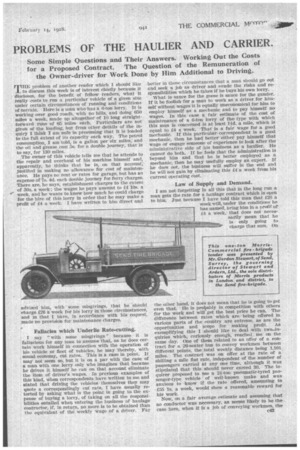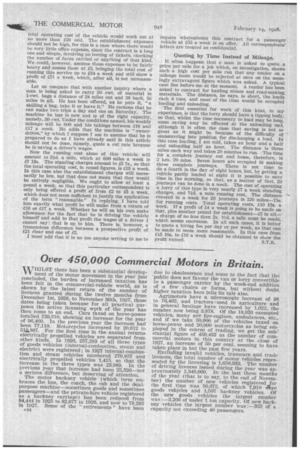PROBLEMS OF THE HAULIER AND CARRIER.
Page 65

Page 66

If you've noticed an error in this article please click here to report it so we can fix it.
Some Simple Questions and Their Answers. Working Out the Costs for a Proposed Contract. The Question of the Remuneration of the Owner-driver for Work Done by Him Additional to Driving.
T'problem of another reader which I should like to discuss this week is of interest chiefly because it discloses, for the benefit of fellow readers; what it really costs to run a particular vehicle of a given size under certain circumstances of running and conditions Of -terrain. Here is a man Who has a 6-ton lorry. It is working over good road's, with no hills, and doing 650 miles a week, made up altogether of 10 long straightforward runs of 65 miles each. Particulars are not given of the loading, but liana other details of the in(mirk Ithink I am Safe in presuming that it is.loaded to the full extent of its capacity each way.. The petrol consumption, I am told, is a gallon per six miles, and the oil and grease cost 5s. for a double journey, that is to say, for 130 miles.
The owner of this vehicle tells me that he attends to the repair and overhaul of his machine himself and, apparently, he thinks that he is, on that account,' justified in making no allowance for cost of maintenance. He pays no rent or rates for garage, but has an expense of 7s. 4d. each double journey for ferry charges. There are, he says, establishment charges to the extent of 30s. a week ; the wages he pays amount to £4 10s. a week, and he wants to know how much he could charge for the hire of this lorry in order that he may make a profit of £4 a week. I have written to him direct and
Fallacies which Underlie Rate-cutting.
T say "with some misgivings" because it is fallacious for any man to assume that, as he does certain work himself in. connection with the operation of his vehicle or fleet of vehicles, he may thereby, with , sound economy, cut rates. This is a case in point. It may not seem so, but it is on a par with the case of man with one lorry only who imagines that because he drives it himself he can on that account eliminate the item of driver's wages. In previous examples of this kind, when correspondents have written to me and stated that driving the vehicles themselves they may quote a correspondingly cut rate, I have usually retorted by asking what is the point in going to the expense of buying a lorry, of taking on all the responsibilities entailed when entering the business of haulage contractor, if, in return, no more is to be obtained than the equivalent of the weekly wage of a driver. Far better in those circumstances that a man should go out and seek a job as driver and evade the risks and responsibilities which he takes if lie buys his own lorry.
What is sauce for the goose is sauce for the gander. If it be foolish for a man to work as a driver for himSelf without wages it is equally uneconomical for him to employ himself as a mechanic and to pay himself no wages. In this case a fair estimate of the cost of maintenance of a 6-ton lorry of the type with which this man is concerned is at least lid. a mile, which is equal to. £4 a week. That is a fair wage for a good Mechanic: If this particularcorrespondent is a good mechanic, then he had better -either pay himself that wage or engage someone of experience to look after the administrative side of his business as a haulier. He cannot do both. If he feels that the administration is beyond him and that he is better employed as a mechanic, then he may usefully employ an expert. If he does not the business will suffer in the end and he will not gain by eliminating this 14 a week from his current operating cost.
Law of Supply and Demand.
I am not forgetting in all this that in the long run a man gets the rate for a haulage contract which is ope.n to him. Just because I have told this man that £26 a week will, under the conditions he has named, bring him in a profit of' £4 a week, • that does not necessarily mean that he is only going to charge that sum. On
the other hand, it does not mean that he is going to get Oren that. He is prol4,ably in competition with others for the work and will get the best price he can. The difference between rates which are being offered in Various parts of the country are extreme, as are the opportunities and scope for making profit. As exemplifying this I should like to deal with two.in(pities which, curiously enough, reached me on the same clay. One of them related to an offer of a contract for a 26-seater bus to convey workmen between different points, the total weekly distance being 1,101 miles. The contract was on offer at the rate of a shilling a mile flat rate, independent of the number of passengers carried at any one time, although it was stipulated that this should never exceed 30. The inquirer proposed to use a 2i-ton pneumatic-tyred passenger-type vehicle of well-known make and was anxious to know if the rate offered, amounting to .£55 Is. a week, would show a reasonable reward for his work.
Now, on a fair average estimate and assuming that no conductor was necessary, as seeing likely to be the Case here, when it is a job of conveying workmen, the c43 total operating cost of the vehicle would work out at no more than 129 odd. The establishment expeuses should not be high, for this is a case where there would he very little office expense, since the contract is a long one and simple, involving no issuing of tickets, checking the number of fares carried or anything of that kind. We could, however, assume these expenses to be fairly heavy and assess them at £5, bringing the total cost of running this service up to £34 a week and still show a profit of £21 a week, which, after all, is not unreasonable.
Let us compare that with another inquiry where a man is being asked to carry 30 cwt. of material in 1-cwt. bags a distance of 28 miles out and 28 back, 56 miles in all. He has been offered, as he puts it, "a shilling a bag, take it or leave it." He reckons that he can make two trips a day and one on Saturday. The machine he has is new and is of the right capacity, namely, 30 cwt. Under the conditions named, his weekly mileage will be 600 and his takings between 116 and £17 a week. Be adds that the machine is "ownerdriven," by which I suppose I am to assume that he is prepared to do as I have already said in this article should not be done, namely, quote a cut rate because he is saving a driver's wages.
Now the running cost alone of this vehiclewill amount to 30. a mile, which at 600 miles a week is 17 13s. The standing charges amount to -.E5 7s., so that the total operating cost, in round figures, is £13 a week. In this case also the establishment charges will necessarily be low, but that does not mean that they would be entirely negligible. We ought to allow at least a pound a week, so that this particular correspondent is only being offered a profit of from £2 to £.3 a week, which does not seem sufficient to justify the application of the term "reasonable." In replying, I have told him exactly what profit he will make from a return of 116 or /17 a week. Whether he will on his own make allowance for the fact that he is driving the vehicle himself and add to that profit the wages of a driver E cannot say : that is up to him. There is, however, a tremendous difference between a prospective profit of £21 clear and one of 12.
I must add that it is no use anyone writing bi me to inquire whereabouts this contract for a passenger vehicle at £55 a week is on offer. All correspondents' letters are treated as confidential.
Quoting by Time Instead of Mileage.
It often happens that a man is asked to quote a price per mile for a job which, on investigation, shows such a high cost per mile run that any tender on a mileage basis would he rejected at once on the seemingly extravagant figure which was asked. A typical ease lies before me at the moment. A reader has been asked to contract for hauling stones and road-making materials. The distance, he says, is short, the loads each 6 tons, and most of the time would be occupied loading and unloading.
The first essential for work of this kind, in my experience, is that the lorry should have a tipping body, so that, whilst the time necessary to load may be long, some saving may be effected at the unloading end, although it is often the case that saving is not so great as it might be because of the difficulty of manoeuvring into position for discharging a load. In this case loading, I am told, takes an hour and a half and unloading half an hour. The distance is three miles each way and takes 20 minutes to run. The time for a complete journey out and home, therefore, is 2 hrs. 20 mins. Seven hours are occupied in making three complete journeys. There is not time to do a fourth in the day of eight hours, but, by getting a vehicle partly loaded at night it is possible to save time in the morning, so that, as a matter of fact, 20 journeys can be done in a week. The cost of operating a lorry of this type is very nearly £7 a week standing charges, and Thd. a mile running cost. The distancecovered in a week for 20 journeys is 120 miles-75s: for running costs. Total operating costs, £10 15s. a week. If a profit of £4 a week is going to be made on that, plus another pound for establishment—£5 in
all— a charge of no less than 2s. 10d. a mile must be made, which seems enormous. In all such cases, it is better to quote a hiring fee per day or per week, as that can be made to seem more reasonable. In this case from 115 10s. to 1.16 a week should be obtained to show the profit named. S.T.R.












































































































